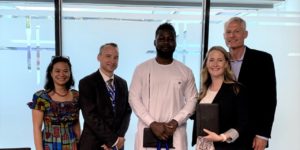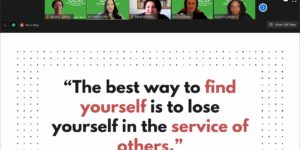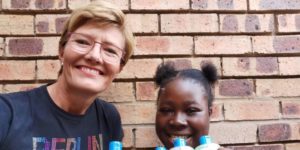Global engagement has been at the heart of the TCS mission since the organization was founded more than a decade ago, in large part because of the vision of President Michael Horowitz. This year, our commitment to global citizenship and cultural exchange was tested in ways none of us could have predicted.
In the spring of 2020, the COVID crisis made uncertainty and chaos the “new normal” for faculty, administration, students, and staff throughout higher education. For many in the TCS community, the sudden impossibility of international travel (or any travel, for that matter) was a major disappointment.
In response to this halt in travel, we dove head-first into bold, pandemic-driven innovation. No matter how great the challenge, we knew we had to find a way to provide rich, meaningful global exposure and engagement — safely, at a distance. Born from this driving commitment, the inaugural TCS Global Engagement Online (GEO) Summit took place in April of 2020. Earlier this spring, we came full circle with our second GEO Summit on April 15, 2021. As the two events “bookended” a year of extraordinary challenge, I find myself reflecting on all that we’ve learned about cultural connection and global impact in an unpredictable world.
Creating successful pathways for virtual global engagement
When we launched our first virtual Summit out of necessity in 2020, not only did we detect some skepticism within the learning community — frankly, we shared it. After all, online programming, no matter how well executed, is not the same as actual travel. Yet the event exceeded all expectations, drawing thousands of participants from around the world for three days of live and recorded online sessions. As we witnessed educators, administrators, and students connecting with such focus and energy, we realized that for those of us who are truly passionate about global engagement, no obstacle is too big to shut down our hunger for cross-cultural experiences. In fact, when we embrace the full potential of online methodologies, “global engagement” takes on a whole new meaning, and countless new paths to exposure, education, and action take shape.
Throughout the past year, we’ve built on the success of our first Summit with extensive virtual programs engaging both globally and closer to home. This evolution resulted in taking on a new identity as the Community and Global Engagement Department, with an expanded charter to foster cultural connection and learning across all communities, whether abroad or here in the United States. For those who might question, as we once did, the depth of cultural experience available through a screen, I’ll share a few favorite examples: In the past year, our students “visited” South Africa where they experienced a hands-on cooking class in the home of a local grandmother. Also in South Africa, they joined together to make virtual music with found household objects under the guidance of a local drumming expert. In Germany, a virtual tour of VW provided a level of up-close exposure and education that may not even have been possible for on-the-ground travelers.
Opportunities for heightened collaboration
At our recent 2021 Summit, language immersion, interdisciplinary exploration and the sharing of personal narratives were just a few of the dynamics that delivered meaningful cross-cultural connection to hundreds of participants. And just as with on-the-ground exchange programs, the impact of these virtual experiences goes far beyond the broadening of individual minds. Whether online or on location, our work is always anchored in the TCS Education System mission: To create innovative, engaged, purposeful agents of change who serve our global community.
Having joined the UN Sustainable Development Solutions Network in 2020, TCS is now positioned more strongly than ever to make a global impact. With this in mind, we focused the entire 2021 GEO Summit on the timeliest of the UN Sustainable Development Goals: #3, Ensuring Health & Well-Being for All. Summit sessions explored topics ranging from local community health outreach to systemic strategies to achieve global health equity.
In addition to presentations from students and faculty, the Summit elevated the work of our newly established Staff Global Engagement Cohort. For several months, this team of staff members from across the TCS community has served as consultants to Ventanilla de Salud, a public health initiative of the Mexican Consulate, supporting health and well-being for the Latinx community in Los Angeles. When I step back and consider that the past year has allowed little to no physical travel for all Summit participants, I stand in awe of the insight, imagination, drive, and optimism reflected in the body of work presented this year.
Rethinking what it means to have a global perspective
I’ve made my career in global engagement because I believe that the more we are exposed to cultures and traditions different from our own, the better choices we can make as global citizens. There was a time when I viewed physical travel as the defining experience by which we can achieve such growth. Today I see this differently. I’ve seen how authentic cross-cultural connection can take many forms, and that all of them are enormously powerful. During a crisis that might have turned each of us inward toward the safe and familiar, we at TCS have seen that we’re capable of reaching instead toward our global neighbors — even against all odds of geography, practicality, and convenience. Together, we’ve seen how a common threat can inspire an even deeper commitment to the values of cross-cultural connection, understanding, and respect.
Today, with the promise of physical travel again on the horizon and all the power of technology in-hand, the paths to Community and Global Engagement for students, faculty, and staff appear infinitely variable, and thrillingly interconnected. With the success of our GEO Summits and other initiatives, not only have we proven that global engagement is essential, we’ve learned how to make it even better. The prospect of tapping this potential moving forward fills me with excitement for our discipline, and indeed, with hope for our world.




